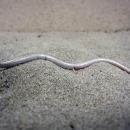
The U.S. Fish and Wildlife Service's approach to Florida panther vehicle mortality has changed. Learn why it's different in our frequently asked questions.
About Us
The U.S. Fish and Wildlife Service is the nation's wildlife management and conservation agency. The Florida Ecological Services Office is the primary Service office serving the state of Florida on matters of federal threatened and endangered species and habitat conservation, including supporting the conservation of private lands; and working with federal agencies and other partners to address fish, plant, and wildlife impacts resulting from their actions. The Florida Ecological Services Office is headquartered in Gainesville, with branch offices in Panama city, Jacksonville, and Vero Beach to better serve those areas of the state.
What We Do
Across Florida, we carry out the Service’s mission by:
- Conserving imperiled species.
- Helping federal agencies identify and address negative plant, fish, and wildlife impacts from projects they fund or authorize.
- Conversing with the American public about wildlife conservation via social media, educational programs, public hearings, and other forms of public interaction.
Our Organization
Our Species
The most current information on Federally-listed species found in the Florida Ecological Services Office area please search the Service's Environmental Conservation Online System ( ECOS ECOS
Environmental Conservation Online System (ECOS) serves a variety of reports related to FWS Threatened and Endangered Species.
Learn more about ECOS ).
Use IPaC to identify your project location and receive an official species list (pursuant to 50 CFR 402.12) of T&E species that should be considered when evaluating the potential impacts of a project.
Projects and Research
Working with others is at the core of our operations. We develop many conservation projects across Florida with federal, state, and local agencies, industry and private groups, and individuals. Whether it is Everglades and coastal restorations, project planning, working with landowners, or conservation at multiple military facilities, among others, effective partnering delivers results. Learn more about our efforts currently underway.
Get Involved
A fundamental tenet in our approach to conservation is engagement with our community – from private landowners wanting to improve endangered species habitat on their land to non-profits doing on-the-ground work.



















